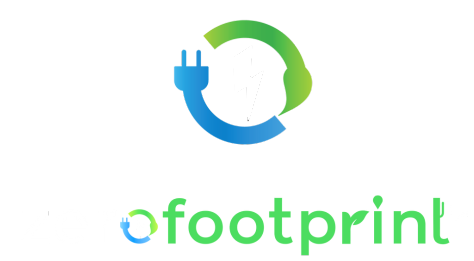Charge with Confidence with ZeroFootprint AC Chargers
A versatile and efficient charging solution recommended for everyday charging of electric vehicles based on their on-board charger and power intake capacity. On an average, an AC Charger will charge an EV from 10% to 100% in 5-7 hours

Compatible
4 Wheeler EVs, Type 2

Safety
Volt, Current, earth protection

Connectivity
Wifi, GSM, RFID, Mobile App
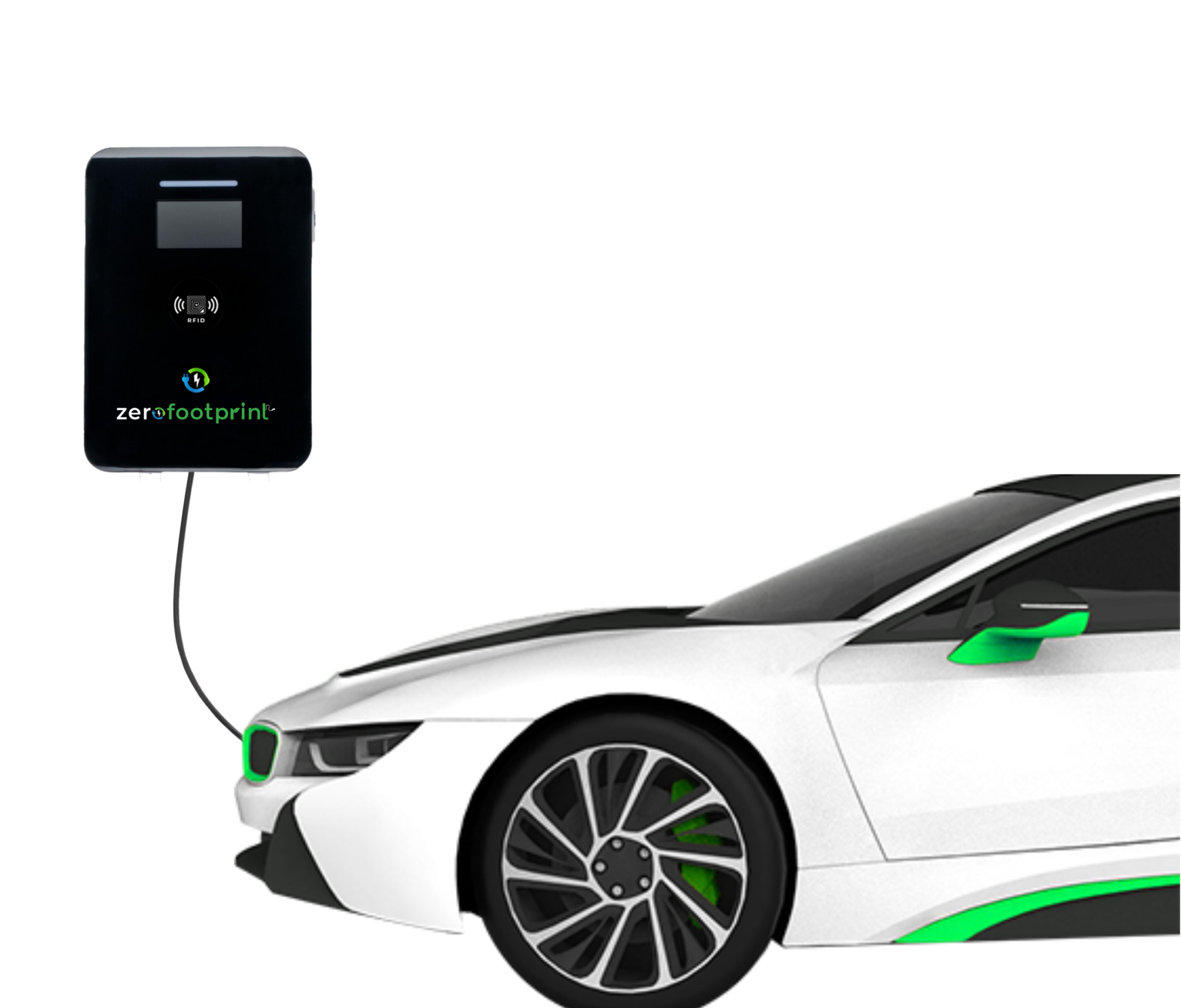
Residential
- Apartment/RWA
- Bungalow/Farmhouse
Commercial
- Office Buildings
- Parking Lots
Fleets
- Last Mile Delivery
- Cab / Taxi
Retail & Hospitality
- Shopping Malls
- Hotels / Resorts
Technical Features
Load management
- Build-in energy meter
- Dynamic load management
- Ready for integration with advanced smart building energy system
Design
- Type 2
- Single & dual gun
- Single phase up to 7.4 kW / 32A
- Three phase up to 22 kW / 32 A
- IP56
- Tamper proof
- LCD Display
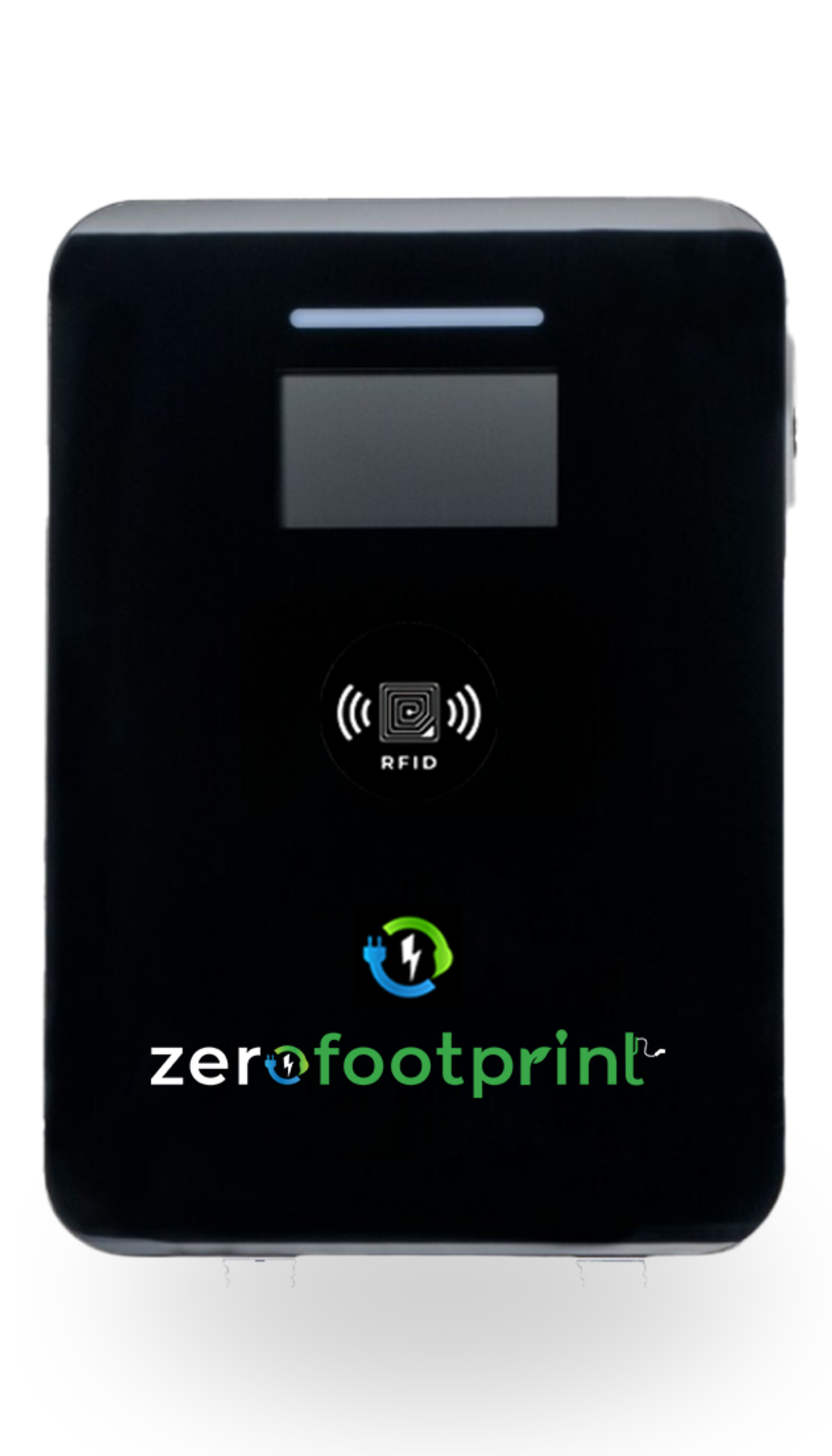
Built-in safety
- Over and under current
- Over and under voltage
- Ground fault
- Surge protection
Connectivity
- Bluetooth
- Wifi
- 4G
- RFID
- OCPP 1.6
- Authentication via RFID, ZeroFootprint Mobile App
- Configuration through ZeroFootprint CMS
Range of AC Chargers
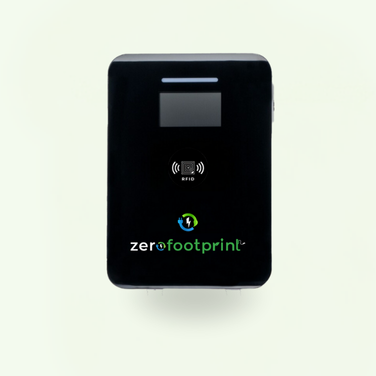
7.4 kW AC Charger
Ideal for everyday charging, the 7.5 kW charger is the most commonly used AC Charger compatible with all four wheeler EV’s. Incredibly robust and cost-effective charger providing a simple, reliable charging experience
- Dynamic load management
- WiFi and 4g connectivity
- Intuitive charger status display
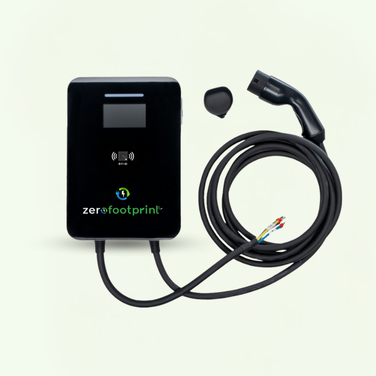
11 kW AC Charger
Delivering faster charging speeds for EV cars with a higher capacity onboard charger
- Our most compact charger
- WiFi and 4g connectivity
- Tidy built-in cable and gun stowage
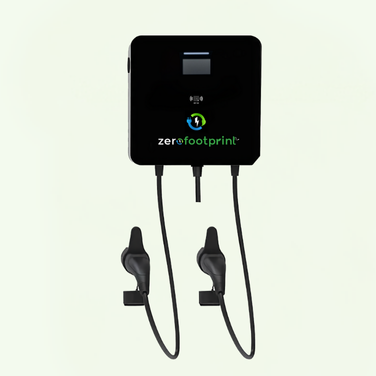
22 kW AC Charger
With its high-power output, this AC charger is the ultimate solution for fast and efficient AC charging for premium luxury cars
- Dynamic load management
- WiFi and 4g connectivity
- Intuitive charger status display
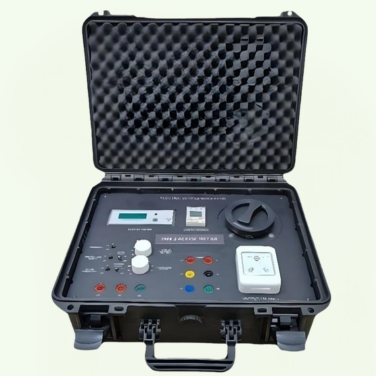
AC EVSE Test Kit
An EV simulator serves as a control system for electric vehicles, commonly used to validate the operation of the charging station and verify that the fundamental functionalities are being performed correctly.
- Dynamic load management
- WiFi and 4g connectivity
- Intuitive charger status display
Return On Investment
- Customer invests in a 7.5 kW AC Charger for INR 50,000 + 40,000 for installation = Rs 90,000
- Per unit cost of electricity = approx Rs. 8 Per KW
- The per unit (per kWh) charging rate is Rs 15 for end drivers
- Assuming 2 cars (Tata Nexon EV Prime) are charged per day at the station from 20% battery charge to 100% (total 7 hours of usage per day)
- 20% - 100% battery charge = total consumption of 24 kW per car (Nexon EV Prime has a 30 kW battery size)
- Total units consumption for 2 cars per day = 48 kW
- Total revenue per day = 48 kW * Rs 15/kW = Rs 720
- Total revenue per year = 720* 365 = Rs 2,62,800
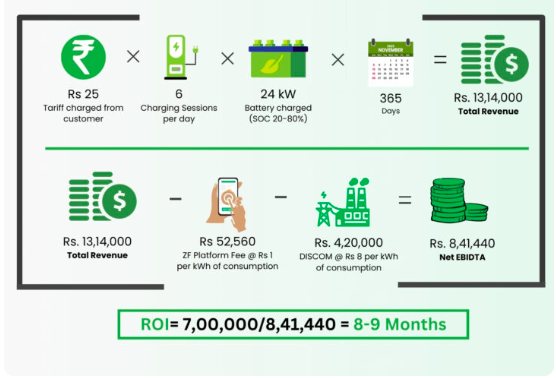
Electric Vehicle Charging Time Calculator
EV Charging Time Calculator
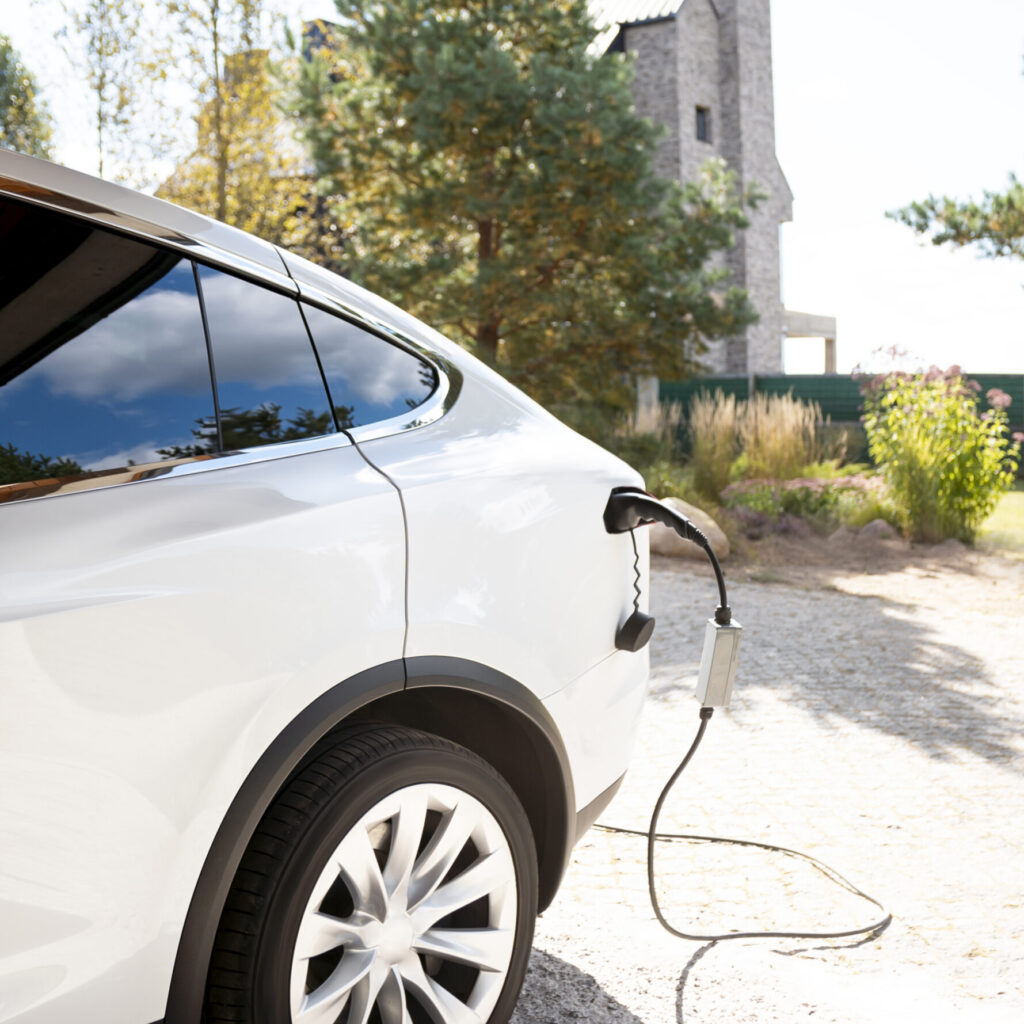
Charger Performance
28 min

Mini Cooper SE
Small car
32.6 kWh
27 min

Kia EV 6
Large car
51.1 kWh
39 min

BMW xDrive 50
Large SUV
111.5 kWh
2.5 hours

Proterra 40’ ZX5+
Bus
450 kWh
28 min

Mini Cooper SE
Small car
32.6 kWh
27 min

Kia EV 6
Large car
51.1 kWh
39 min

BMW xDrive 50
Large SUV
111.5 kWh
2.5 hours

Proterra 40’ ZX5+
Bus
450 kWh
28 min

Mini Cooper SE
Small car
32.6 kWh
18min

Kia EV 6
Large car
51.1 kWh
26 min

BMW xDrive 50
Large SUV
111.5 kWh
2 hours

Proterra 40’ ZX5+
Bus
450 kWh
28 min

Mini Cooper SE
Small car
32.6 kWh
14 min

Kia EV 6
Large car
51.1 kWh
24 min

BMW xDrive 50
Large SUV
111.5 kWh
2 hours

Proterra 40’ ZX5+
Bus
450 kWh
QUESTIONS & ANSWERS
Frequently Asked Questions
How does an EV AC Charger work?
Unlike Level 2 Mode 2 chargers that plug into a regular wall outlet, Level 2 Mode 3 EVSE AC chargers connect directly to the electrical grid. This allows for safer and faster charging, typically delivering between 7kW and 22kW of power. However, the actual charging speed depends on two factors: the charger’s output and the car’s onboard charger capacity. Both the charger and the car’s onboard charger need to be compatible for maximum power delivery (between 7kW and 22kW).
How do I get my charger installed?
We’ll ensure a smooth installation process by supporting you every step of the way. Our team will assess your site and recommend any necessary upgrades to your utility supply or electrical grounding. Once the hardware and software are installed, we’ll hand over your fully functional charging station. Feel free to contact us if you have any questions.
What types of EV AC Chargers are available?
EV AC chargers come in various forms including Level 1, Level 2, and Level 3 (DC fast chargers). Level 1 chargers use a standard household outlet, Level 2 chargers require a dedicated charging station, and Level 3 chargers are high-powered units typically found in public charging stations.
How long does it take to charge an EV with an AC Charger?
Charging time depends on the charger type (power output), vehicle battery capacity, and remaining charge. Level 1 chargers are slow, taking several hours for a full charge. On the other hand, Level 2 chargers are faster, typically refilling most EVs overnight. Level 3 stations are designed for rapid charging, delivering up to 80% charge in just a few minutes.
Are EV AC Chargers compatible with all electric vehicles?
Most EV AC chargers are compatible with all electric vehicles that use the standard charging connector types. However, it’s crucial to check the compatibility of the charger with your specific vehicle model.
Can I charge my EV using a standard wall outlet?
While Level 2 charging stations typically use a higher voltage outlet (240V) for faster charging, there are some Level 2 chargers that can use a standard 240V household outlet. These Level 2 chargers offer slower charging speeds compared to their higher-voltage counterparts. However, they’re a convenient option for overnight charging or when faster charging isn’t necessary.
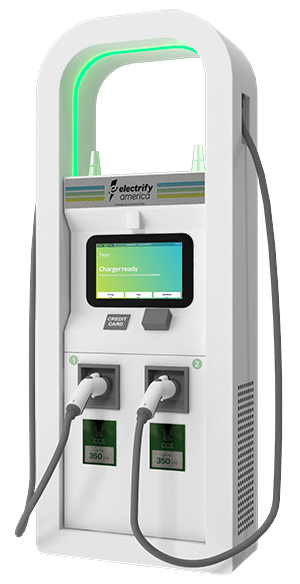
ZeroFootprint Portable Chargers are the best choice for on the go charging
Any Questions? Ask Us!!
Magna voluptatum dolorem! Dolores! Sociosqu commodo nobis imperdiet lacinia

